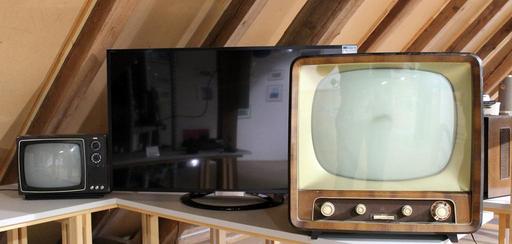
Welcome to the Historical TV Guide!
About the Project
The Historical TV Guide uses digital tools to gather available textual data sources on television programming in the 1950s. Only 5-10% of what was broadcast in these early years of TV has been preserved, and much of this was done on kinescope technology that has also been subject to significant deterioration over time. We created our dataset in the hope that it might be used to reconstruct a rich and accessible historical record that might do justice to the range and character of television programming broadcast during the early decades of TV. In the multiverse of DH projects, this is a database project. Our ultimate goal is to build a publicly accessible database that allows for searching by keywords, data analysis and visualizations.
The project began in August of 2011, when Kathy M. Newman worked with Steven Gotzler in the creation of a tabular database of 1950s television shows based on entries in a TV encyclopedia. In 2017 Newman and Gotzler were awarded an Andrew W. Mellon Digital Humanities Seed grant to update and improve the database using digital tools for a project that was initially titled the “Mapping the Television Mega-Text.”
In the initial phases of our study, in addition to building the dataset, we wanted to find a way of exploring that data to show that 1950s television was more diverse in terms of race, ethnicity, and social class than scholars have often remembered it to be. Contrary to conventional wisdom, television in the 1950s was weird and heterogeneous, full of working class characters and themes, and ideologically diverse as well. Following television scholar Horace Newcomb, we hoped to argue that television during the 1950s functioned primarily as a cultural forum—a place where “meaningful difference” could be confronted, negotiated and explored—rather than as an ideological monolith or cultural leveler.
During the duration of the Mellon grant (2017-2018) Gotzler and Daniel Evans, a digital developer, worked closely together to gather and merge data from the internet archive and IMDB, creating an extensive and detailed dataset of 1950s U.S.television programming information. They met regularly with Newman, DH consultant Scott Weingart, and Emma Slayton, who helped with data visualization. Initial analysis was conducted using python3 in Jupyter Notebooks, and examined working-class content in Action & Adventure programs, and Newman and Gotzler presented the project and their preliminary findings at the Society for Cinema and Media Studies (SCMS) annual conference in March, 2018.
Contributors
Kathy M. Newman, Associate Professor of English - Carnegie Mellon University
Steven Gotzler, PhD Candidate in Liteary and Cultural Studies - Carnegie Mellon University
Daniel J. Evans, JStor Labs - formerly, Carnegie Mellon University
Scott Weingart, Program Director, Digital Humanities - Carnegie Mellon University Libraries
Emma Slayton, Data Curation, Visualization, and GIS Specialist - Carnegie Mellon University Libraries
Resources
A brief video explaining the project and its aims in more detail was produced for the Digital Humanities Literacy Guidebook. You can view the video here.
Further Information on the dataset, and its sources can be found on the project’s repo on GitHub here: https://github.com/dSHARP-CMU/megaText
The GitHub repo also contains the jupyter notebooks from our preliminary analysis of working-class content in the Action & Adventure genre. For more information on our preliminary analysis check out Episode 01
Future Directions
We hope our initial analysis shows how easy it is to construct searchable databases for texts that are potentially unwieldy, and provides a reproducible model for using similar methods to study film, radio, music, and other hard-to-access/hard-to-engage-with texts.
Going forward, we hope to use the dataset we’ve compiled to build a public facing and searchable “Historical TV Guide” and conduct further collecting, cleaning, and centralizing of data from sites such as Wikipedia, as well as archival issues of the print sources like TV Guide.
If you are interested in collaborating on growing the dataset, or have access to unique archival materials about TV please contact us.
Kathy M. Newman - kn4@andrew.cmu.edu